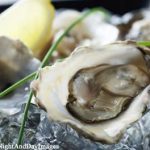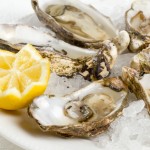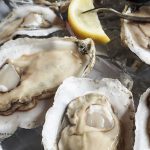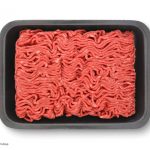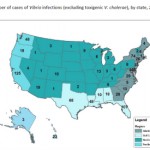The Washington State Department of Health has confirmed that oysters from Samish Bay is the source of at least one Vibrio illness, commercial harvesting has been ended until September 30, 2014. Vibrio parahaemolyticus is a bacteria that causes gastrointestinal illness in people. There have been nine reports of Vibrio illness this summer in Washington state. The latest confirmed illness is linked to a commercial, not recreational, harvest. There is no word on which specific commercial grower the contaminated shellfish came from. Low tides, hot weather, and sunshine increase the bacteria's population in the summer. Anyone who harvests oysters in that area should cook them to be safe. Vibrio are killed by cooking temperatures. In fact, the government suggests that all shellfish … [Read more...]
Norovirus Outbreak Linked to Texas Oysters
A norovirus outbreak is linked to oysters from Texas. The FDA is warning consumers not to eat raw or partially cooked oysters harvested from Copano Bay in Aransas County, Texas, that were harvested between December 26, 2013 and January 9, 2014 because they may contain norovirus. The Texas Department of State Health Services closed the Bay to shellfish harvesting on January 9, 2014. Six norovirus illnesses in Louisiana have been linked to oysters harvested from that Bay and shipped by Alby's Seafood of Fulton, Texas. A recall of the oysters harvested on December 26, 2013 has been issued, but other shellfish harvested from Copano Bay before it was closed may still be in the marketplace. All shellfish dealers, restaurants, retail food establishments, and consumers are advised to check … [Read more...]
Wegmans Recalls Oysters for Possible Vibrio Contamination
Wegmans is recalling Cape Neddick Blue Point oysters, sold individually, because they may be contaminated with Vibrio parahaemolyticus. This bacteria can make you sick if the oysters are eaten raw. Only Cape Neddick/Blue Point oysters with these UPC codes are recalled: 2-06146-00000, 2-06152-00000, and 2-06153-00000. The oysters were sold at Eastway, Canandaigua, Lyell Ave, Hornell, Fairmount, Corning, Ithaca, Johnson City, Niagara Falls Blvd, and Jamestown stores in New York; Warrington, Collegeville, Harrisburg, King of Prussia, Erie Peach St., Wilkes-Barre, Williamsport, Allentown, Bethlehem, and State College in Pennsylvania; and Dulles, Fairfax, Fredericksburg, Lake Manassas, and Leesburg in Virginia. The shellfish was also sold at Hunt Valley, Columbia, Bel Air, Frederick, and … [Read more...]
Denotta Company Recalling All Pacific Oysters for Possible Vibrio
The Denotta Company of Hood Canal, Washington is recalling all Pacific oysters, varying in size from extra small to large, for possible Vibrio Parahaemolyticus contamination. The oysters were distributed nationwide. The harvest dates of the oysters are from July 5, 2013 to July 25, 2013. The states that received the oysters include Arizona, Oregon, California, Colorado, Florida, Hawaii, Georgia, Illinois, Kentucky, Minnesota, Missouri, Nevada, New York, Nebraska, Michigan, Ohio, Pennsylvania, Massachusetts, and Tennessee. There are more states involved; the Washington State Department of Health will have more information as more states are contacted. Vibrio parahaemolyticus is a bacterium in the same family that causes cholera. The bacteria is in coastal waters in the U.S. and Canada … [Read more...]
Texas A&M Researchers Kill Norovirus in Oysters with Electron Beam
Researchers at Texas A&M University have developed a way to pasteurize oysters without chemicals or heat using an electron beam. A study measuring the method’s efficacy on norovirus and hepatitis A appears in the June issue of the scientific journal Applied and Environmental Microbiology. Hepatitis A is virus that causes a liver disease that can last for weeks or months, according to the Centers for Disease Control and Prevention (CDC). Symptoms include fever, fatigue, loss of appetite, nausea, vomiting, abdominal pain, dark urine, clay-colored bowel movements, joint pain and jaundice. Symptoms usually develop two to six weeks after exposure and can last up to six months. Sometimes called “the stomach flu,” norovirus is an extremely contagious virus responsible for half of all … [Read more...]
OIG Audit Finds Beef Not Adequately Tested for E. coli
The Office of Inspector General of the USDA recently reviewed FSIS testing of boxed beef that is processed into ground beef or mechanically-tenderized steaks to see if the processes are adequate and used effectively to determine the sources of E. coli contamination. They found that FSIS needs to re-evaluate its methodology, since all boxed beef product is not adequately tested. Downstream processors grind boxed beef without sampling it for E. coli. In addition, grocery stores, butcher shops grind their own beef but FSIS does not sample and test trim at these facilities. E. coli 0157:H7, along with six STEC bacteria (Shiga toxin producing E. coli) are considered adulterants in raw beef. The report details twelve recommendations in response to five findings, including planning to modify … [Read more...]
Eight Cases of Vibrio Food Poisoning Linked to Oysters Reported in Massachusetts This Year
The Cape Cod Times is reporting that eight cases of Vibrio food poisoning were reported in Massachusetts this year from oysters. Last summer the state designed new regulations to keep consumers safe from this bacteria, but they failed. The eight cases were linked to oysters harvested from Wellfleet, Orleans, Edgartown, Duxbury, Kingston, Barnstable, and Dennis. Public health officials think that increased public awareness may be part of the cause of this outbreak, but warmer water and air temperatures this last summer may be to blame. Vibrio was not seen in Massachusetts oysters until 2011 because the state's colder water temperatures discouraged the growth of the bacteria. In every month in 2012, the mean air temperatures were higher than average, including the third-warmest April and … [Read more...]
Drakes Bay Oysters Recalled for Vibrio; Three Sickened
Drakes Bay Oyster Co. in Marin County California is recalling shucked and in-shell oysters. They may be contaminated with Vibrio parahaemolyticus, a bacteria that can cause serious illness. In fact, the oysters are linked to an outbreak that has sickened three people so far. The affected oysters include shucked oysters in 9 ounce, 1 pint, 1 quart containers and half gallon jars and tubs. The lot numbers are 363 through 421. The in-shell oysters are sold individually or in bags ranging from 1 dozen to 7 dozen. Harvest tags range from July 17, 2012 to August 8, 2012. If anyone has any of these oysters, do not eat them; throw them away. Symptoms of Vibrio infection include abdominal cramps, diarrhea, headache, vomiting, fever, and chills. Those in high risk groups, including the very … [Read more...]
FDA Warns Consumers Against Eating Shellfish from Oyster Bay Harbor
The Food and Drug Administration (FDA) is warning consumers to not eat raw or partially cooked oysters and clams with tags listing Oyster Bay Harbor in Nassau County, New York as the harvest area. Eight people in several states have been sickened with Vibrio parahaemolyticus food poisoning after consuming those foods. The New York Department of Environmental Conservation (DEC) closed Oyster Bay Harbor to shellfish harvesting on July 13, 2012. The FDA told shellfish harvesters, shippers, re-shippers, processors, restaurants, and retail food establishments to dispose of any shellfish that have identity tags showing Oyster Bay Harbor was the harvest area and harvest date on or after June 1, 2012. The area will remain closed until samples taken by the DEC indicate that shellfish are no … [Read more...]
Washington State Warns of Increased Bacteria in Raw Oysters
Right on the heels of a Vibrio outbreak in Missouri, the Washington state Department of Health is warning consumers to cook oysters before eating them. Traditionally, raw oysters are avoided in the summer months (months without an "R" in the name) because Vibrio parahaemolyticus grows more readily in brackish water during the warm summer months. Jerrod Davis, director of the Department of Health's Office of Shellfish and Water Protection, said in a statement, "Vibriosis is completely preventable. We want people to enjoy our state's wonderful shellfish, and following some simple safety tips can help keep people healthy this summer." Most people cook shellfish, such as oysters, mussels, and clams, until the shells open. But that's not enough to kill any bacteria that may be present. … [Read more...]
